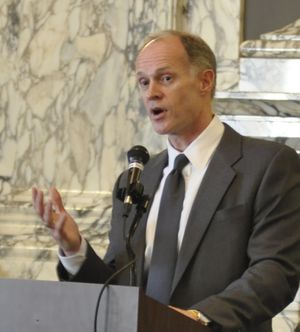Rodney Tom calls it quits
Rodney Tom addresses a delegation from Spokane last January.
OLYMPIA -- Rodney Tom, a Republican turned Democrat who joined with GOP members of the Senate to form a ruling coalition for the last two years, will not run for re-election this fall.
Tom, currently the Senate majority leader, announced today he concluded over the weekend "the decision not to run is the right one for me and my family."
He called his service as leader of the Majority Coalition Caucus "an opportunity of a lifetime for me personally". . .
To read the rest of this item, or to comment, click here to continue inside the blog.
First elected to House in 2002 as a Republican, Tom announced he was switching to the Democratic Party in 2006 to run against Republican Luke Esser for the Senate seat. He won that race, and his 2010 re-election as a Democrat. But Tom and conservative Democrat Tim Sheldon joined the Senate's 23 Republicans in 2013 to form a coalition that controlled the chamber even though Democrats at the time held 26 seats. Without Tom and Sheldon, they had only 24 votes in the post-election reorganizations that followed the 2012 election. After the 2013 special elections, Republicans picked up one seat, but still needed the coalition to control the Senate.
The coalition would focus on jobs, education and a sustainable state budget, Tom said repeatedly, at times using that mantra to deflect criticism from fellow Democrats about failure to bring to a vote certain issues like abortion rights which Tom said he personally supported.
Democrats were targeting Tom in the upcoming election, and recruited Kirkland Mayor Joan McBride to challenge him as a Democrat in the 48th, which includes Bellevue, Medina and other communities east of Lake Washington. Tom hired a Republican, Keith Schipper, as his campaign manager and the GOP currently has no announced candidate for the seat.
Questions arose, however, what would happen to the two Democrats in the coalition if the Republicans gained one more seat this fall and had enough votes on their own to form a majority. Sen. Don Benton, R-Vancouver, was quoted earlier this year in The Seattle Times as predicting if the GOP gained a a majority, Tom would lose his post and its members would elect a Republican majority leader.
As a fiscal conservative and social liberal, Tom sometimes took shots from members of both caucuses. He angered fellow Democrats in 2010 when he voted against the state budget, even though he served as vice chairman of the committee that helped write it. He angered some of the more conservative Republicans in the coalition caucus earlier this year when the Senate was allowed to vote on, and eventually passed, a bill that allows students who aren't American citizens to qualify for some college aid if they've been in the state long enough.
Senate Democratic Leader Sharon Nelson said Tom leaves a mark on the Legislature that won't be forgotten quickly: There's no question he will be remembered vividly for his work on both sides of the aisle and in multiple caucuses," Nelson said in a press release.
Senate Republican Leader Mark Schoesler called Tom's decision a great loss for his district and the state but "choosing family and your health first is always the right decision." In its two years, the coalition produced a budget that is projected to be balanced over four years, froze college tuition for the first time in 26 years and made a downpayment on public school obligations, Schoesler said.
Tom suffered from kidney stones in the closing days of the most recent session, although he remained at the Capitol for the final votes. In an e-mail to other members of the Senate, he said he's still working though that, and his father, 85, suffered a broken leg recently when struck in a crosswalk.

